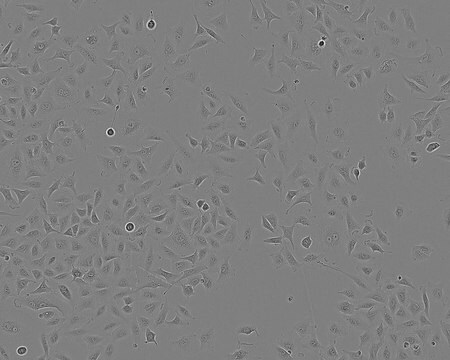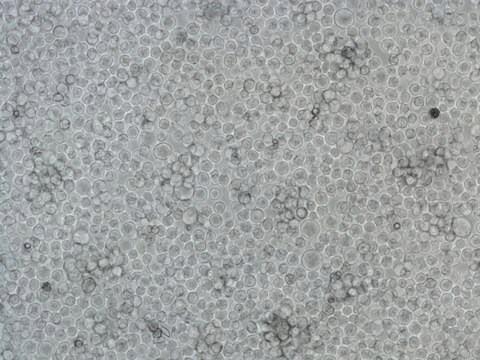RAJI Cell Line human
85011429, human lymph, Lymphoblastoid
Synonym(s):
GM04671 Cells, P1-Raji Cells
Sign Into View Organizational & Contract Pricing
All Photos(1)
About This Item
UNSPSC Code:
41106514
Recommended Products
product name
RAJI Cell Line human, 85011429
biological source
human lymph
description
Human Black, Burkitt′s lymphoma
growth mode
Suspension
karyotype
2n = 46, diploid
morphology
Lymphoblastoid
products
Not specified
receptors
Not specified
technique(s)
cell culture | mammalian: suitable
relevant disease(s)
cancer
shipped in
dry ice
storage temp.
−196°C
Cell Line Origin
Human Burkitt′s lymphoma
Cell Line Description
Established in 1963 from Burkitt′s lymphoma in an 11 year old male. Growth is in the form of single cells without attachment and as macroscopically visible clumps containing many hundreds of cells. Resistant to VSV. This cell line carries the latent Epstein-Barr Virus (EBV) genome and is positive for EBNA. RAJI is sometimes referred to as a ′non-producer′; the EBV genome carries deletions attributed to preventing the formation of virus particles. Ethnicity: Black.
Application
Resistance and virus studies: vesicular stomatitis virus (VSV).
RAJI Cell Line human has been used to investigate the transport of V. parahaemolyticus across the Payer′s patch of the intestinal epithelium and it has been co-cultured with Caco-2 (human colorectal adenocarcinoma cell-line) monolayers to study bacterial translocation.
RAJI Cell Line human has been used to investigate the transport of V. parahaemolyticus across the Payer′s patch of the intestinal epithelium and it has been co-cultured with Caco-2 (human colorectal adenocarcinoma cell-line) monolayers to study bacterial translocation.
DNA Profile
STR-PCR Data: Amelogenin: X,Y
CSF1PO: 10,12
D13S317: 13
D16S539: 8,11
D5S818: 10,13
D7S820: 10
THO1: 6,7
TPOX: 8,13
vWA: 16,19
CSF1PO: 10,12
D13S317: 13
D16S539: 8,11
D5S818: 10,13
D7S820: 10
THO1: 6,7
TPOX: 8,13
vWA: 16,19
Culture Medium
RPMI 1640 + 2mM Glutamine + 10% Foetal Bovine Serum (FBS).
Subculture Routine
Maintain cultures between 3-9x100,000 cells/ml; 5% CO2; 37°C.
Other Notes
Additional freight & handling charges may be applicable for Asia-Pacific shipments. Please check with your local Customer Service representative for more information.
Certificates of Analysis (COA)
Search for Certificates of Analysis (COA) by entering the products Lot/Batch Number. Lot and Batch Numbers can be found on a product’s label following the words ‘Lot’ or ‘Batch’.
Already Own This Product?
Find documentation for the products that you have recently purchased in the Document Library.
Our team of scientists has experience in all areas of research including Life Science, Material Science, Chemical Synthesis, Chromatography, Analytical and many others.
Contact Technical Service





